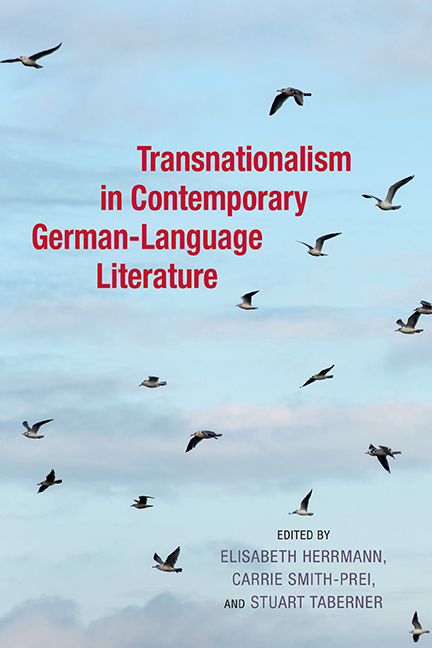1 - How Does Transnationalism Redefine Contemporary Literature?
Published online by Cambridge University Press: 10 June 2021
Summary
WHEN EXPLORING THE EFFECTS that transnationalism has on contemporary societies, cultures, and economies, on different lifestyles and individual biographies, and more specifically—as is the objective of this volume—when exploring the ramifications of transnationalism within contemporary literature, it is necessary to not only look at each of those areas separately but also inspect their interdependency and reciprocal impact. Accordingly, this chapter is devoted to a definition of contemporary German literature in the twenty-first century that links an investigation of transnationalism to the question of how daily life experience and literature actively shape each other. Transnationalism in this context is understood as the local, national, cultural, and economic, but also biographical manifestations of globalization in everyday life. It will be investigated particularly with regard to the fact that writing in Germany has increasingly become transnational over the last two decades.
As a first step, this chapter will refine the often used but not precisely defined term “contemporary literature” in order to identify specific features and the changing conditions of literature in times of globalization. The chapter further establishes a theoretical basis that identifies transnationalism not solely as a theme but as a literary concept that can fruitfully be connected with a reconceptualization of world literature as a phenomenon of literary mobility. Fictional works by German authors of different national and transnational backgrounds will be used as examples to demonstrate that transnationalism builds a significant pillar in contemporary German literature and redefines it in various ways. The textual examples examined in this context are Ilija Trojanow's Der Weltensammler (The Collector of Worlds, 2006), Daniel Kehlmann's Die Vermessung der Welt (Measuring the World, 2005), Christian Kracht's Imperium (Empire, 2012), Felicitas Hoppe's Hoppe (2012), and Dan Vyleta's crime fiction Pavel & I (2008), The Quiet Twin (2011), and The Crooked Maid (2013). Within the examination of these texts special attention will be paid to the correlation between language and national identity or affiliation, physical and intellectual mobility, and the conditions under which literature travels the world. This will eventually lead us to ask how national, transnational, and world literature are connected with each other and how literature mirrors those changes that are currently happening in our society.
- Type
- Chapter
- Information
- Publisher: Boydell & BrewerPrint publication year: 2015
- 1
- Cited by



